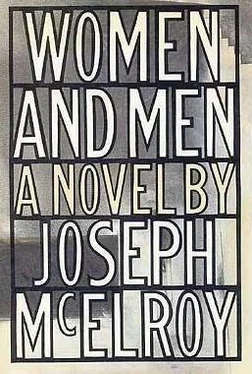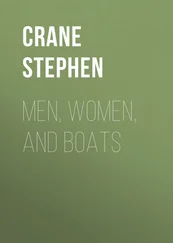east to the Susquehanna Iroquois who he had heard nearby would tell him the meaning of two dreams he had had after fighting to the death a Plains Cree warrior with six rifles lashed to his horse over the way he had wasted half the body of a great queenly bison in order to get her hide to paint his conquest of her on — in the middle of one solitary morning’s vast and silver dawn during the spring when he discovered invisibility both in the presence of his father and far away while watching a Thunder Dreamer at a campfire wrestle a many-fingered yucca-creamflower-eating mestizo until the two of them became one suspiciously looking for the young nomad Navajo studying them while chewing a local winter-loving plant like prince’s pine but up there called by the Cree pipisisikweu ("it breaks it up into small pieces") — though he felt so firmly his invulnerability to their single-minded search for him that he knew the leathery leaves and pink and dark-pink flower had dispersed his material appearance sufficiently for him to be quosi-quaia unseeable for a time. .
and north to the Iroquois of the New York State where Margaret said a relative of her family had visited a league of Indian nations so devoid of poverty he had written her big-footed cousin Alexander that to be poor in America was your own fault in general and here was a society where no one stole, and white men in other worlds had heard of this and would copy it. . the Navajo Prince, thinker and studier of things, will not put mere vision of one or two pale-faced boys over truth, guessing from the Hermit that, just before leaving, Margaret was with child: so it was way too soon for those two to be his own sons looking pale-faced up at the sky: nor need they be two! for suddenly they are one again in the face of the pale-haired woman wrapped in a green blanket here at what she pitied as not much of a camp at all, talking to him about being out of work and of a man who will lead an army of jobless soon and she was his beloved cousin near here along the Susquehanna but is not any more, while the Navajo Prince knows perhaps in her honest face that the vision of the two boys who were one and then one again is their vision and theirs is of him, here, and thinking of the waste of his forces wandering these continental paths in search of knowledge and the Princess and the eastern coast, he feels the sweat of his buckskin pocket’s bison tongue and wakes to such residue of that current that flew through him forth and back into the farm doorways he has visited that he is stabbed to understand that the hunter couple crossing that disintegrating isthmus were a nearly unthinkably long time past and the boy or boys seen by him are ahead in time so that while he cannot understand how that can be, for he knows that that boy is not yet born, he knows he is seen by the boy, watched in wonder, it comes to him in the midst of the woman’s words about a man named Jacob Coxey he doesn’t know and a cruel town named Chicago he does know though through the Hermit, who had watched over Margaret there and had studied the shadow of the wind blasting off the Chicago Lake and the secrets of new stone buildings in which people would work — knew of Chicago also through Margaret, who found it a wonderful meeting of all nations — meanwhile as that boy who is at once a man lying as if buried where he sleeps looks straight upward not over here toward the Navajo Prince in 1894, the Navajo Prince by some turn knows himself to be there before that boy’s eyes, light that glances off the boy’s speaking lips and that bends vision to oneself and gets bent and divided by it into other people’s stories that ours become, divided by it into the useful and the great, the colored and the penetrating, and is a mask through which the orphaned Prince recognizes the holes in his head, the eyes forming and the nose and mouth, holes opening even before the face forms in some time held glimmering within a cloud maybe like the cloud above him that he knows contains his old acquaintance the Anasazi in his interim and humorous compromise with reincarnation; and the Prince is glad that this future boy-man he has seen sees not only him but other worlds, other moons, other mesas, valleys, skies, new food sources that could keep hungry people from weakness (for Margaret’s circle cakes called doughnuts that she had said did not puff out well enough gave strength though made one want more and more, indeed like Margaret’s words), even new beings in those other worlds of the future that like the bison’s tongue-flesh could compact the past and life of other beings into power that the Great Spirit or all the gods dispersed in smaller scale could receive and return as creative force for living at peace; and the Prince now could read the very light on the lips of that boy who is somehow Margaret’s boy, and the lips meet and part, meet and part, was he recalling happily something eaten? was he saying Margaret’s name? for the Navajo Prince can’t be sure he’s not finding himself on that dividing mouth, having found his creature self inside that glimmering cloud, with something like light running out of it which was only unfriendly when it came from farmhouse doorways that did not understand a stern, hungry Indian who refused to steal field roots or chickenhouse eggs, only unfriendly when it was that current that passed out into and through him and then passed back, returning into the farmhouse doorways from which it came so that he did not want to wake to what it was, lest he feel pain or die, until now he realized it was Time.
How long have you been here? the pale-haired vagabond woman asks and she sits down beside him tight and tall in her blanket as the cloud closes above them and his wrist presses the metal of his pistol and its designs.
How long is the future? he asks.
The future takes too long, she says. The workingman is forgotten every day. That is why Coxey’s Army will set out on Easter Sunday from Ohio and Pennsylvania and New York to march to Washington.
The white workingman, the Navajo Prince replied, feeling in his right palm the sweat of unknown compactions breathing from the cut of bison tongue, word of him among his People, his going-away, his mutual teaching with an Anglo beloved whom he told of the original casa blanca not in white Washington but in sandstone Canyon de Chelly, oh word of him, his love for an Anglo and for his studies, his mother’s death, stories woven larger and larger in the future he now had a terrible belief in, or pressed smaller and smaller by ostracism and forgetting.
The woman opened her blanket and reached and gripped his shoulder to the bone. Tomorrow is what matters, she said.
Will they march from New Jersey? he asked, and wondered if the pale-faced boy who was not his son, yet was, and who he knew watched him here from years ahead in future but might not know he did, saw this night’s scene in his dream of the past or must rely on Margaret to tell him what he knew.
The woman said she did not know. She brought a loaf of bread out and asked if he had any food to go with it and asked him for a knife. The Mexican blue mare rubbed her neck along the shadow of a beech tree. The cloud, the night-lumen cloud, had moved. I have a horse, the Prince said, but then he said what he had meant: I have a woman.
He felt himself grow so sleepy the sounds of his horse were magnified.
What is Easter Sunday? he asked.
He was born on Easter Sunday, the woman said. It doesn’t matter.
The woman looked hungry and he found a potato and an apple in his bag and gave them to her. He got up and bade her goodbye. She was looking at what he had given her. She looked back over her shoulder at the horse, which snorted. You need to sleep, she said.
He changed his mind. He lay down beside her where she sat.
Читать дальше












